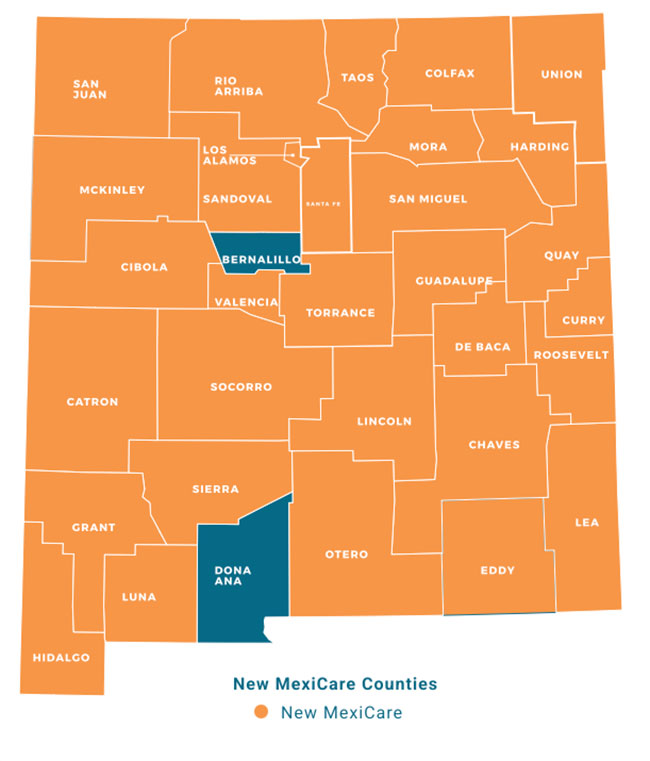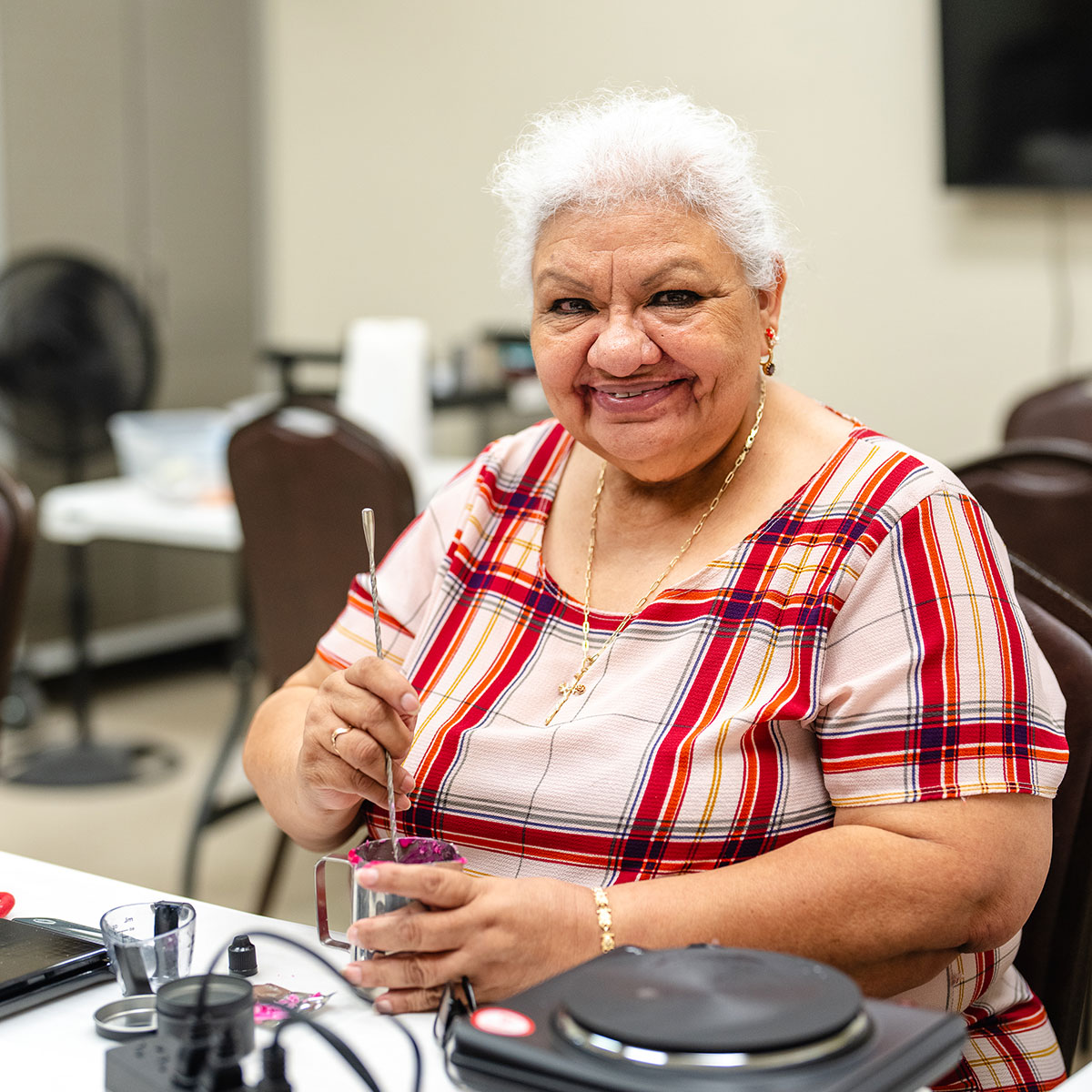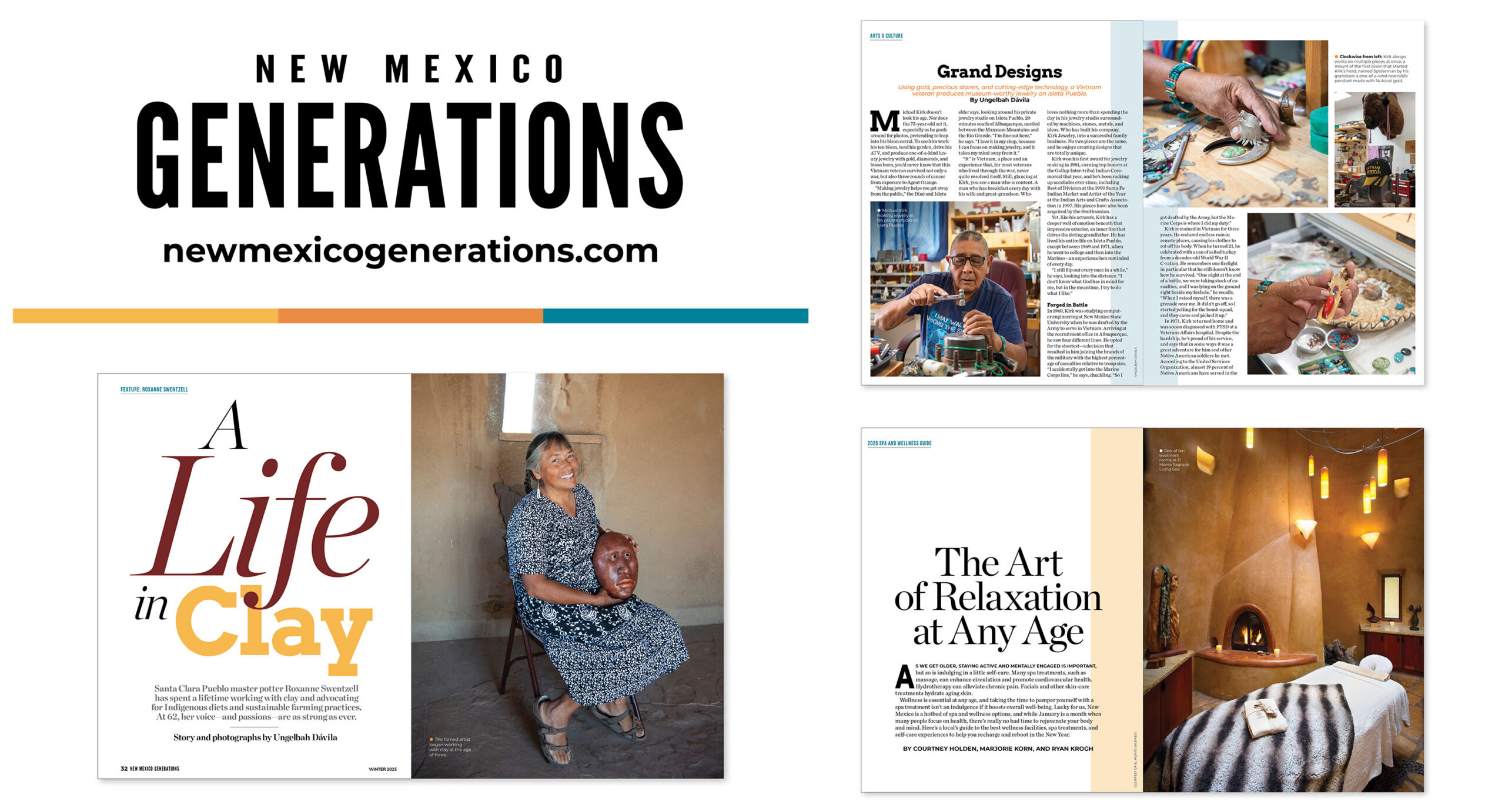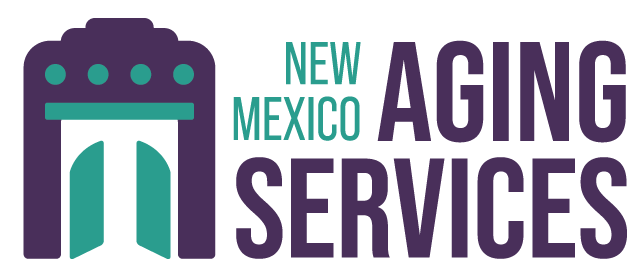Meet the New Mexico Aging & Long-Term Services Department
At the heart of the Aging and Long-Term Services Department’s mission is the belief that New Mexico’s older adults and adults with disabilities have the right to remain active participants in their communities, to age with respect and dignity, to be protected from abuse, neglect, and exploitation and to have equal access to health care. The Department is a leader in developing programs and building partnerships that support lifelong independence and healthy aging.
WHO WE ARE
- The national award-winning Adult Protective Services Division investigates allegations of abuse, neglect, and exploitation to ensure the safety and well-being of vulnerable adults 18 years and older.
- Our Aging Network oversees programs that impact older adults including senior services, food security, employment opportunities, capital outlay funding, and connection to services provided by New Mexico’s Area Agencies on Aging.
- The Aging & Disability Resource Center (ADRC), within the Consumer and Elder Rights Division, represents one piece of a nationwide system dedicated to helping people find resources and connecting them with services designed to facilitate healthful, independent living.
- New Mexico’s 23 Tribes, Pueblos and Nations are served and supported by the Office of Indian Elder Affairs (OIEA). OIEA operates the Indian Area Agency on Aging and works with the Navajo Nation Department of Health’s Division of Aging and Long-Term Care Support. OIEA and its partners strive to develop a comprehensive, coordinated service system that includes tribal senior and adult day service centers.
- Residents, families, friends, and caregivers put their trust in long-term care facilities. They expect and have a right to safe environments that meet standards of care and provide a quality of life. New Mexico Long-Term Care Ombudsman spend time in facilities meeting with residents and management, offering an avenue for expressing and resolving concerns.
- Long-Term Care (LTC) programs provide supports and services to individuals who need assistance with activities of daily living due to aging, chronic illness, disability, or other conditions. These programs help individuals maintain their quality of life, maximize their independence, and ensure safety.
The New Mexico Aging Network is comprised of the Aging & Long-Term Services Department, Area Agencies on Aging (AAAs), and providers within each of the planning and service areas (PSAs). The NM Aging Network has two “federally recognized” AAAs that serve four of the designated Planning and Services Areas (PSAs) in the State.


NOTE: PSAs 5 & 6 serve the NM portion of the Navajo Nation, the 19 Pueblos, Jicarilla Apache Nation and Mescalero Apache Tribe, and are not pictured on this map.
Agency Overview
The New Mexico Aging & Long-Term Services Department provides accessible integrated services to older adults, adults with disabilities, and caregivers, to assist in maintaining their independence, dignity, health, safety, and economic well-being, thereby empowering them to live independently in their own communities as productively as possible.
New Mexico’s Caregiving Landscape*
270,000 caregivers provided 250 million caregiver hours = $3.8 million in economic value**

20%
provide regular care to a friend or family member with a health problem or disability

34%
have provided care for longer than 5 years

10%
provide care for someone with dementia or Alzheimer’s Disease

21%
provide 40 or more hours of care a week

53%
helped another manage personal care (e.g. giving medications, feeding, nothing)
* Behavioral Risk Factor Surveillance System Survey Data, U.S. Department of Health and Human Services, Centers for Disease Control and Prevention, with New Mexico Department of Health
** Reinhard, Susan C., Selena Caldera, Ari Houser, and Rita B.Choula.Valuing the Invaluable 2023 Update: Strengthening Supports for Family Caregivers.
Washington, DC: AARP Public Policy Institute. March 8, 2023.
New MexiCare
New MexiCare was designed to allow older adults to thrive in their homes and communities. The program provides financial assistance to eligible care recipients who are assisted by family, a friend, or community member with daily activities due to physical or cognitive limitations.
New MexiCare provided over $1.3 million in direct care service value between Spring 2023 and December 2024.Visit NewMexiCare.org to learn more about the program and eligibility requirements.
New MexiCare is available in 31 counties, all but Bernalillo and Doña Ana at this time (January 2025).”

Budget Request
TOTAL: $74.3 million (3.9% increase over FY25)

Consumer & Elder Rights Division
$892,200 (200)
$300,000 (300)
Fund (5) unfunded full-time ombudsman & additional (5) full time ADRC staff, permanently
Contractual services – call center

Aging Network Division
$400,000 (400)
$690,800 (400)
Federal match for the AmeriCorps Volunteer Program, including supports for tribal elders.
To strengthen direct services to Aging Network to increase participation & attendance at senior centers, including a targeted investment for elders of Tribes, Pueblos, and Nations.

Long-Term Care Division
$500,000 (200)
Re-activate the Long-Term Care Division.
Special Budget Request
Total: $12.1 million

Kiki Saavedra Senior Dignity Fund
$9.5 million
To address high-priority services for senior citizens in New Mexico, including transportation, food insecurity, physical and behavioral health, case management and caregiving.

Information Technology
$500,000
To consolidate, modernize, and maintain customer-focused, effective and innovative information technology systems.

Marketing & Outreach
$1,500,000
For an appropriate marketing strategy and educational outreach to connect the aging population and their caregivers to available resources.

Emergency Preparedness
$600,000
Emergencies, disaster preparedness and urgent supplemental programmatic needs.
Legislative Performance Measure Highlights FY24
Legislative Performance Measure Highlights FY24
Adult protective Services
-
- Over FY24, APS conducted 437 outreach presentations, vastly exceeding the target of 180 presentations for the year
- Achieved the 99% target of face-to-face contact with alleged victims for priority two investigations
Aging network
-
- 20% of older New Mexicans with high nutritional risk received meals through aging network programs, 3% over the target of 17%
- Over 220,000 hours of caregiver support provided through volunteer programs during FY24, exceeding the target of 167,000 hours.
Consumer & Elder Rights
-
- Received over 10,000 calls, representing an over 2,000 call increase since the 3rd quarter (average of 165 calls per day).
- Satisfactorily resolved 94% of calls in a single contact, exceeding our target of 90%.
- Constituents who accessed referred services within 30 days remained steady at 100%, exceeding the target of 90%.
Long-Term Care ombudsman Program
-
- During the 4th quarter of FY24, 99% of residents remain in the community for six months following a nursing facility transition, exceeding the goal of 90%.
- 46% of long-term care facilities were visited by members of the long-term care ombudsman program, exceeding our target of 40%.
- 100% of complaints were resolved within 60 days
Office of Indian Elder Affairs
-
- Assisted Tribal Elders and their families by providing information about available support services and resources.
- Advocates for and facilitating state general funding allocations, IAAA/NAAA contract management of state general funds, technical assistance, advocacy and training.
Funding for the Kiki Saavedra Senior Dignity Fund
What is the Ask?
Secure a $9.5 million investment for the Kiki Saavedra Senior Dignity Fund to address quality of life needs for seniors including expanding access to senior services like transportation, food security, physical and behavioral health, case management, and caregiving.
What is the Justification?
- The Kiki Saavedra Senior Dignity Fund directly supports seniors by providing resources for transportation, food security, home modifications, and other critical services.
- New Mexico’s 65+ age category is projected to have the greatest growth of any age group, increasing by more than 80,000 by 2040. This growth requires a robust funding mechanism to meet escalating needs.
- Expanding the Fund ensures equity, particularly for rural and underserved communities, and supports seniors’ ability to age in place, with dignity and independence.
Talking Points:
- “Our goal is ambitious but achievable: to ensure the increased number of eligible seniors have access to the supports they need through the Kiki Saavedra Senior Dignity Fund. expanding access to senior services will help older adults live independently, in community, and with a good quality of life for as long as possible.”
- “This Fund transforms lives by eliminating barriers to essential services. It is about access, empowerment and providing opportunities to thrive.”
- “New Mexico’s aging population is growing, and with it, the need for comprehensive support systems. Consistent funding is critical to meeting the needs of New Mexico’s older adults today and into the future.”
- “We call on legislators and community partners to join us in championing the Kiki Saavedra Senior Dignity Fund. Collaboration is the key to sustaining and growing the fund for generations.”
- “Recent Fund spending includes bolstering the Aging Network, Area Agencies on Aging, and food security and nutrition through New Mexico Grown, a collaboration that brings local produce and goods to senior centers, home delivered meals, and food boxes.”
- “Next fiscal year, the Fund will continue to provide food security, respite and caregiving training and support, transportation vouchers, care companions, senior employment, and expansion of the New MexiCare Caregiver Health Model into Bernalillo and Doña Ana counties.
Reactivating the Long-Term Care Division
What is the Ask?
Secure $892,000 to re-establish and adequately staff the Long-Term Care Division to coordinate programs like New MexiCare and Veteran-Directed Care that offer caregivers and their recipients training, respite, and compensation.
What is the Justification?
- The Long-Term Care Division is critical to addressing the needs of an aging population that requires long-term care services, such as nursing homes, assisted living facilities, and home-based care.
- Reactivating this division strengthens access to home and community-based services and caregiver-based programming and supports not otherwise provided or administered by the Health Care Authority, with the goal of keeping people in their communities for as long as possible.
- The Division will serve as a central resource for coordinating efforts to reduce fragmentation in care delivery.
Talking Points:
- “The growing senior population in New Mexico underscores the urgency of reactivating the Long-Term Care Division. Without adequate care infrastructure, seniors and their support network face significant challenges in accessing quality support.”
- “The Long-Term Care Division plays a crucial role in promoting equitable access to care, particularly for underserved populations in rural and tribal areas. We are committed to ensuring that all seniors, regardless of their location, receive the support they need.”
- “Long-Term Care Division professionals can support seniors’ needs for services and resources, in part, through programs intended for non-Medicaid recipients, such as New MexiCare, other publicly funded programs, and private options.”
Modernizing and Enhancing Department Capacity
What is the Ask?
Secure $7.2 million investment to modernize infrastructure, technological solutions, and increase staffing capacity to ensure ALTSD can serve the needs of today’s aging population and be adequately prepared to respond to and meet future demands on the state’s aging and long-term care systems.
What is the Justification?
- Modernizing technology and processes will improve service delivery, enhance data-driven decision-making, and streamline operations.
- Strengthening the Aging & Long-Term Services Department’s capacity positions it to better serve the aging population with technological solutions, responding quickly and proactively to challenges like emergency preparedness and response.
- Supporting long-term care systems that help New Mexicans navigate the landscape is an underfunded need. Programs like the Long-Term Care Ombudsman require additional resources to protect residents’ rights. The Aging & Disability Resource Center to offer equitable access to counseling and guidance, and the Aging Network to expand senior services through the Area Agencies on Aging and senior centers statewide.
Talking Points:
- “Upgrading technology is a top priority for ALTSD. Implementing integrated case management systems and enhancing cybersecurity measures will allow us to securely manage sensitive information and provide more efficient and effective services for seniors, adults with disabilities and their caregivers.”
- “With updated systems and right-sized staffing levels, the Department will be better positioned to prepare for and meet growing demand that will require innovative strategies and new ways of offering programs and services that improve overall quality of life.”
Aging & Long Term Services FY26 Budget Recommendation
Consumer & Elder Rights Division
Convert 6 positions from term with funding through federal grants to permanent and funded with general fund, and the addition of 3 new positions.
Recommendation $1,192,200
Aging Network Division
To strengthen direct services to Aging Network Area Agencies on Aging and Indian Area Agencies on Aging.
Recommendation $1,090,800
Long-Term Care Division
Re-activate the Long-Term Care Division.
Recommendation $500,000
Kiki Saavedra Senior Dignity Fund Special Appropriation
To address high-priority services for senior citizens in New Mexico, including transportation, food insecurity, physical and behavioral health, case management and caregiving.
Recommendation $9.5 million non-recurring
Emergency Preparedness Special Appropriation
Emergencies, disaster preparedness and urgent supplemental programmatic needs.
Recommendation $600,000
Marketing & Outreach Special Appropriation
For marketing and educational outreach to connect the aging population and their caregivers to available resources.
Recommendation $1,500,000
Information Technology Special Appropriation
To enhance technological advances in the agency’s services ecosystem across the state.
Recommendation $500,000
Get Involved
Find Your Legislator
Follow this link to the New Mexico State Legislature directory Learn More
Aging Network Division (AND)
What are the Aging Network and Senior Services?
Finding help for older adults.
Senior Services provides contractual oversight and technical and programmatic support for all state and federally funded Older American Act programs, three of the State’s Area Agencies on Aging, federally sanctioned Volunteer Programs (Foster Grandparent Program, Senior Companion Program, Retired and Senior Volunteer Program), and with the New Mexico Senior Olympics and New Mexico State Bar Foundation/Legal Resources for the Elderly Program.
Working with other Department divisions, State Agencies, Area Agencies on Aging and contract providers, the Bureau’s Program Managers work to ensure the effective and efficient administration and management of federal and state funds, and also to ensure that the highest quality of services are being provided to older adults, adults with disabilities, families and caregivers throughout our state.
Consumer And Elder Rights Division (CERD)
How can our ADRC (Aging & Disability Resource Center) help you?
The ADRC offers free, unbiased, expert information and assistance with your Medicare decisions, to assist elders, persons with disabilities and caregivers to find services and resources to help them live well and independently.
Ombudsman
New Mexico’s older and disabled adults need advocates like you.
As an Ombudsman, you offer long-term care residents the voice they need at times when they need it most. Join other dedicated, caring individuals in a shared quest to provide safety, dignity, and quality of life to our older adults.
- Ensure people receive the rights they deserve
- Ensure people receive the care they deserve
- Help investigate and resolve concerns
Learn more about becoming an advocate for elders.
Office of Indian Elder Affairs

Advance OIEA Operations
In FY24, OIEA focused on assessing barriers the Tribal Provider centers were facing post pandemic. Evaluation of these challenges and changes, provided an opportunity to reevaluate methods, tools, and efficiencies to support and better equip the Tribal Provider to meet those challenges and identify sustainable solutions.

Meaningful Tribal Site Visits
ALTSD Cabinet Secretary Jen Paul Schroer, Deputy Secretary Sarah Jacobs, Deputy Secretary Antoinette Vigil and several Division Directors, including OIEA Director Sanchez visited Tribal Provider sites throughout FY24. Tour facilities and gained first-hand knowledge of a site’s progress, challenges, and accomplishments

Bridged Programming to Tribes, Pueblos & Nations
An OIEA organizational focus is to increase awareness of ALTSD’s programs, services and resources to Tribal Provider’s, elders and caregivers. This focus takes into consideration serving tribal elders living off reservations who are consumers of AAA provider centers and facilities.
Recent Outreach Videos
New Mexico Grown

New Mexico Grown is a collaboration focused on returning New Mexico’s food system to a local, sustainable state. New Mexico Grown is a program that works with local farmers, ranchers, and food businesses, connecting them to schools, senior centers, and food banks. Everyone from seniors to students benefit from nutritious, locally sourced food. This program supports sustainable food systems, builds strong local economies, and helps communities stay vibrant and self-reliant.
New Mexico Generations Magazine
New Mexico Generations magazine is a new quarterly publication dedicated to enhancing the quality of life for all New Mexicans as they age, offering resources, inspiration, and a sense of community to those 50 years old and older. Learn More


A new vision for aging in New Mexico
Aging and long-term service is one of New Mexico’s defining issues. What we do here today will affect every single citizen of New Mexico for generations.
Thriving in New Mexico
The benefits of a thriving senior population are overarching for our state:
- Increased economic vitality
- Savings in medical costs
- Savings in lost productivity from seniors and family caregivers
- Improved health outcomes across the board

